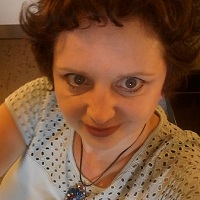When I was in junior high, I wrote this poem called “I Am the Sea.”
Drifting
Sparkling
Feeling free
Laughing
Talking
I AM the sea.
I gave it to an English teacher who placed it in the yearbook.
Years later, between moves, my daughter Hayley found it in an old box. Seeing my poem, she read it out loud. I cringed, laughing awkwardly. She did not laugh—no, she was perplexed.
Her response was half question, half exclamation: “You were like this, then?” I asked her what she meant and she said, “Well, you still think that you are the sea. And the wind. And the rain!”
I still see the silly and whimsical 14-year-old Leona in me, now. Forever believing in our ability to blossom and fly, I think I must have always felt that the best example of our nature was right outside the window. Mama Nature knows things. North, south, east and west, she calls and guides us physically, metaphorically, and spiritually through her elements, directions, and seasons.
Growing up in a small, Catholic community, the word calling was not really a familiar one. The word that was used was vocation, and I heard it a lot in my late teens. In fact, after graduating from high school I attended a “vocational school” where I learned about the beauty industry.
Over the years, I’d been asked by my clients if I always knew that hair was what I wanted to do, but the truth was that I had very little sense of who I wanted to be when I chose to become a hairstylist. What I did know is that I loved people, artistic expression, fashion, community, beauty, good humour, great stories, and conversations, whether comfortable or uncomfortable. Once I held a pair of shears in my hands, I felt a belonging, a call, a way to go deeper with all of the things that grabbed my attention.
The word “callings” suggests being summoned, pulled, or invited from a space between longing and belonging. I think that a calling is a lot like an ancient blueprint that has been painted over with free will. A call that is answered can become a conscious act of alignment for curiosity, purpose, passion, adventure, and presence.
While the path of the calling can change many times in one lifetime (and often does for many), it may also be one steady ascending journey. Yes, there are many folks who never discover, hear, or answer their call—that does not mean that they do not have one. I am not insisting upon dogmatic pursuit here or even that each of us must find our one ultimate life purpose. I’m talking about mindful exploration, following the path of our natural inclinations in this moment, and, through a playful sort of poking about, seeing where it might take you.
I’m talking about paying attention to the stuff that delights you, but I’m also talking about paying attention to the stuff that bugs the crap out of you, too. There is an interesting and specific energy connected to this brand of spiritual nosiness and (sometimes) prickly inquiry.
In her book, The Call (created around her prose poetry of the same title), one of my favorite Canadian authors, Oriah Mountain Dreamer, shares an interesting perspective on the heartbeat, the word, the underbelly as it were, of a calling. She writes about finding the “word” that your soul wants you to go home to. She makes it clear to her readers that she does not know what their word is. But she does tell them where to look.
“Look to your failures,” she urges, “at the places where you most easily go to sleep and become unconscious about what you are doing.” She asks us, “What internal habit or attitude or tendency repeatedly robs your life of joy?”
This particular question was completely opposite the new age writings that I was so captivated by—the ones that encourage their readers to focus upon their natural gifts and abilities. I was absolutely baffled the first time I came across this idea. I didn’t disagree, I just had no clue what she was talking about.
I write songs, but I had never felt called to teach anyone else to do this. However, after reading Oriah’s words, I was asked to facilitate a workshop on self-esteem for girls between the ages of 11 and 15 one summer, and I immediately set about creating a spoken-word/songwriting circle. My purpose was to support them in finding words, melodies, and sounds to say, “I am Goddess. Hear me roar!”
Framing it through rhythm and lyrics just felt natural for me, though it was not about the art of crafting songs or poetry. It was about forming an intentional circle of light so we could hear, sense, and feel something—so we could clear away old stories and connect to spirit. These amazing young women ached to hear, know, remember, and believe that they are brilliant right now, just as they are.
My natural, God-given tendencies were the tools I used to help them answer a call, but my skills were not the call itself.
The nature of our talents lets us know we are blessed. We have been given gifts. Oriah explained it best when she said, “We can not teach what we never had to learn, and we learn most where we have to stay conscious in order to learn.” My natural gifts were what helped me develop enough skills to ask these young women to write a song with me, but this was not the reason I was called to be with them. The universe had sent me a group of bright, honest mirrors.
And in that moment, I realized that my word is “Enough.” But I unconsciously knew my word long before my great awakening. It had been showing up everywhere, slapping me on the cheek when I let my ego take hold, and when I gracefully embraced it—like I did with the young women that day—kissing me on the other.
Since then, I have made it a habit to ask myself these questions:
If my life ended abruptly now, have I given enough?
What is enough?
Have I ever been enough?
Is just being with what is now, enough?
How can this quest for being enough heal the places that need healing in my own heart, and also be an invitation for inquiry and healing for others?
When Oriah Mountain Dreamer was seeking her word, she knew that her word was not beauty, truth, love, or peace. These, she says, are “essence words…words that all of us are here to return to.” She assures us that our individual words are smaller words, and are “about ways in which particular human beings learn to live with and embody their truth or beauty or love or peace.”
“Let the Lover pull you to your feet and hold you close,
dancing even when fear urges you to sit this one out
Remember—there is one word you are here to say with your whole being.
When it finds you, give your life to it, don’t be tight lipped and stingy
Spend yourself completely on the saying
Be one word in this great love poem we are writing together.
~ Excerpted from The Call by Oriah Mountain Dreamer
I am here to learn that I am enough. This has allowed me to get practiced and passionate about inspiring others to consider that they, too, are enough. Who would be better suited and more committed to offer this service than the person who desires and needs to learn this for her/his self?
When we tell our stories and heal our fears through sound, words, blessings, wisdom, texture, art, breath, spirit, and colour, we can begin to attune our energy to the “one word” that will enable us to hear and answer our call.
~


 Share on bsky
Share on bsky





Read 3 comments and reply